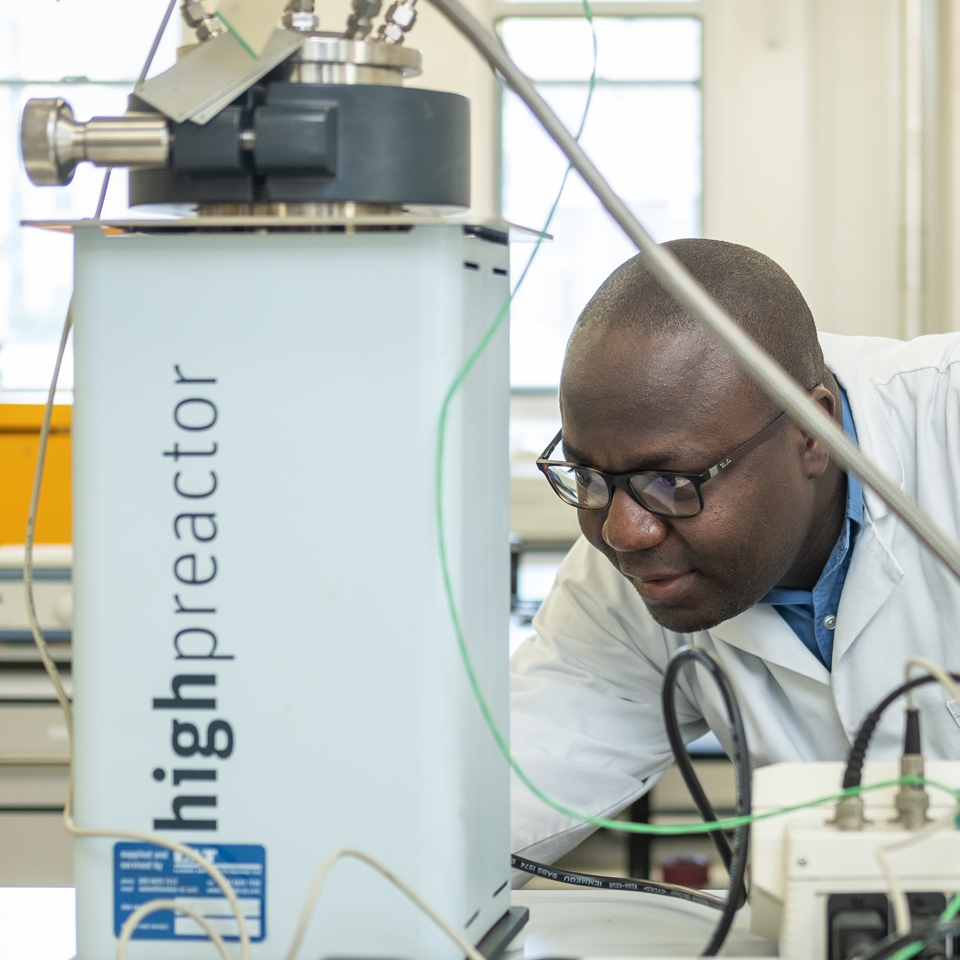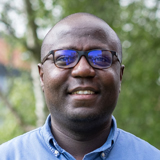Dr Oluwasola (Sola) Afolabi
RAEng Engineering for Development Research Fellow, and Lecturer in Water and Environmental Engineering - Architecture, Building and Civil Engineering
Dr Oluwasola Afolabi’s research explores innovative waste management practices. In 2019, he was awarded an RAEng Engineering for Development Research Fellowship to tackle the threats posed by agricultural food waste (AFW) in sub-Saharan Africa (SSA) where about 90% of it is illegally disposed of or incinerated – creating harmful emissions, pollution and public health risks. Meanwhile, energy scarcity is widespread in SSA. Oluwasola’s work is addressing these challenges – developing processes to convert AFW into clean bioenergy.
Bioenergy solutions empower lives
Safe and economically sustainable solutions for the recovery of clean energy from environmentally polluting waste streams could help to radically improve the health and lives of millions of people worldwide – while supporting efforts to combat climate change.
In SSA, 82% of households rely on traditional solid fuels – including firewood and charcoal – or highly polluting petrochemicals such as kerosene. The household air pollution (HAP) caused by these fuels accounts for 600,000 deaths every year in this region. Sustainable clean energy generation is urgently needed to reduce harmful emissions and save lives.
My research interests lie in waste management – but looking beyond safe disposal. I believe that finding imaginative ways to convert waste into sustainable bioenergy could really improve economic, health and environmental outcomes, particularly in low- and middle-income countries.
On the one hand, AFW poses many problems but is rich in organic content – making it perfect for energy recovery purposes. On the other, thousands of homes in SSA do not have access to clean energy sources to meet their domestic energy needs, including cooking.
By synergising these long-standing, entwined challenges, I hope to find ways to solve both.

I am developing an integrated synergic system from biological and thermochemical waste conversion processes to manage AFW and realise clean renewable bioenergy that can be stored and transported for diverse energy applications.
My planned innovations represent cutting-edge engineering responses to address the shortcomings of existing waste management practices, domestic energy shortages and HAP risks.
So far, my work has taken me on an exciting journey, both figuratively and literally. I’ve worked on international development projects – independently and collaboratively with academics, industry, government bodies and NGOs – delivering life-enhancing benefits to communities across the global south.
For example, as part of the Bill and Melinda Gates Foundation’s Re-invent the Toilet Challenge, I conducted field-test prototypes of the Loughborough HTC Toilets, including in China and Senegal.
Being awarded my RAEng Fellowship is an honour and means that I can continue my work. Knowing that my research could change and improve lives is fantastically rewarding.
I believe engineering interventions must be co-developed with local partners who understand the diverse cultural and social needs of the population. Inclusive research design is the only way to nurture real solutions and public acceptance of them.
When the RAEng granted my Engineering for Development Research Fellowship, in 2019, I was given the opportunity to progress my dream of developing innovative engineering solutions to address enduring global problems.
There’s much to do, but I’m keen to rise to the challenge.
My research journey
I’ve always wanted to be an engineer. Growing up, I was fascinated with how things work, and this curiosity still serves me well. What’s more, as an engineer I’m able to address long-standing challenges, especially in the developing economies, and help find solutions.
After completing my undergraduate degree – graduating with a First in Agricultural Engineering – I was awarded the prestigious Commonwealth DFID Scholarship (2010) to pursue my postgraduate studies in Environmental Studies. I joined Loughborough and was awarded my MSc in 2011.
I secured doctoral funding – and held Research Associate roles – as part of the Bill and Melinda Gates Foundation’s Re-invent the Toilet Challenge. My doctoral thesis demonstrated the novelty and safety of the microwave-hydrothermal carbonisation process and the potential to make human waste harmless whilst providing carbon-neutral energy and a soil-conditioner that permanently binds carbon.
Being awarded my RAEng Engineering for Development Fellowship (2019) was an honour and means that I can continue my work – enhancing waste management practices and creating clean energy in developing economies.
Knowing that my research could change and improve lives is fantastically rewarding.
